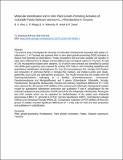| dc.description.abstract | The present study investigated the diversity of culturable rhizobacteria associated with potato (S. tuberosum L.) in Tanzania and assessed their in vitro plant growth-promoting (PGP) activities to deduce their potential as biofertilizers. Potato rhizosphere soil and tuber samples (54 samples in total) were collected from 9 villages in three different agro-ecological regions in Tanzania. A total of 145 rhizobacterial isolates were obtained, 52 of which were selected and identified by partial 16S rRNA gene sequences and screened for various PGP traits in vitro including qualitative and quantitative solubilization of phosphorus (P), zinc (Zn) and potassium (K), nitrogen (N2) fixation and production of ammonia (NH3) in nitrogen-free medium, and indole-3-acetic acid (IAA), gibberellic acids (GA) and siderophores production. The results showed that the isolates were all Gammaproteobacteria, belonging to 4 families (Enterobacteriaceae, Yersiniaceae, Pseudomonadaceae and Morganellaceae) and 9 genera (Enterobacter, Klebsiella, Serratia, Pseudomonas, Morganella, Buttiauxella, Pantoea and Cedecea). Significant differences (P < 0.05) were observed for all assessed PGP abilities of the external and endophytic rhizobacterial isolates except for quantitative siderophore production and qualitative P and K solubilization for the external rhizobacteria and production of IAA and GA for the endophytic rhizobacteria. Among the best PGP isolates which can be exploited for biofertilization of the potato were Klebsiella pneumoniae KIBS1, K. grimontii LUTS10, Serratia liquefaciens KIBT1, Enterobacter ludwigii KIBS10 and Citrobacter freundii MWALS6. Comparative evaluation of PGP abilities of these two groups of isolates revealed significant differences (P < 0.05) only for NH3 and IAA production and qualitative K solubilization. | en_US |

